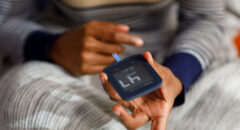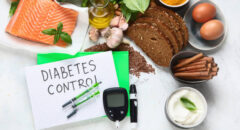
Picture this, you've just been told you are prediabetic and need to make some lifestyle changes before it progresses to full-blown diabetes. Where do you start? Well, according to new research, you could start by eating fewer carbs.
While low-carb diets are a common next step for someone diagnosed with diabetes, if you are prediabetic or have diabetes not treated with medication, you don't need to wait to cut back and see benefits to your blood sugar levels.
"The key message is that a low-carbohydrate diet, if maintained, might be a useful approach for preventing and treating type 2 diabetes, though more research is needed," says lead author Kirsten Dorans. She's an assistant professor of epidemiology at Tulane University School of Public Health and Tropical Medicine in New Orleans.
For the study, the researchers studied two groups of 75 people each. In one, participants were assigned to a low-carb diet. The other ate as usual.
Six months later, the low-carb diet group had greater drops in hemoglobin A1C, which is a marker for blood sugar levels. That group also lost weight and had lower fasting blood sugar levels.
While the study doesn't prove that a low-carb diet prevents diabetes, it opens the door to further research on how to work through health risks of those with prediabetes and diabetes not treated by medication, Dorans shares.
"We already know that a low-carbohydrate diet is one dietary approach used among people who have type 2 diabetes, but there is not as much evidence on effects of this diet on blood sugar in people with prediabetes," Dorans said in a university news release. "Future work could be done to see if this dietary approach may be an alternative approach for type 2 diabetes prevention."
RELATED: Cutting Carbs? Try These Veggie Swaps to Fill Your Plate
How to reduce your carb intake
So how do you reduce your carb intake? Start with these tips:
1. Avoid sugar-sweetened drinks
One can (12 fluid ounces) of non-diet cola contains 35 grams of carbs, and one small sweetened iced tea drink contains 29.5 grams of carbs.
Consuming sugar-sweetened drinks like sodas or sweetened iced teas can add a lot of extra carbs to your diet and spike your blood sugar levels leading to the onset of type 2 diabetes so it is wise to limit your consumption of these drinks.
2. Cut back on refined grain bread
Unlike refined grain bread, unrefined whole-grain bread is a complex carb. In other words, it takes longer to digest and affects your blood sugar gradually instead of all at once.
Refined grains can reduce the bread's micronutrient and fiber content, causing the bread's sugar and carbs to be processed quickly in the body. This can lead to blood sugar spikes and type 2 diabetes.
3. Fruit juice isn't as healthy as you think
Just because it has fruit in it, doesn't mean it's healthy for you. While fruits are packed with fiber, fruit juices contain little to no fiber and are usually high in fructose, a form of fruit sugar that is also considered a simple carb.
Whatsmore, fruit juice is very similar to sugar-sweetened beverages (like soda) in terms of sugar and carbs. For example, 1 bottle (around 10 fluid ounces) of 100% apple juice contains 35 grams of carbs, most of which is sugar. For this reason you would be wise to pick up a piece of fruit instead.
4. Try lower-carb snacks
When you are looking for something to snack on, think twice before grabbing chips, pretzels, and crackers. These snacks are usually low in protein and fiber, two macronutrients that are responsible for making you feel full. Without them, you may end up eating much more than you initially planned.
Nuts, cheese, and eggs are lower in carbs, higher in protein and much healthier for you.
RELATED: The Real On Dieting, Carbs & Sugars
5. Have a low-carb breakfast
Breakfast foods may seem healthy at first glance, however, they can have hidden amounts of carbs and sugar.
For example, a cup of store-bought granola can have around 68 grams of carbs, and a cup of Raisin Bran cereal can have around 46 grams.
For a quick and easy breakfast with fewer carbs, try eggs. One egg contains less than 1 gram of carbs. Eggs are also a great source of high-quality protein and will help you feel fuller for a longer amount of time and eat less throughout the rest of the day. Even, better eggs are versatile and can be taken on the go for those busy mornings when you are in a rush.
6. Focus on non-starchy vegetables
Vegetables are healthy and full of nutrients and fiber. However, if you're trying to keep your carb intake down, you'll want to choose non-starchy vegetables. The American Diabetes Association suggests non-starchy vegetables such as artichokes, asparagus, broccoli, carrots, mushrooms, and tomatoes.
With these simple changes, you're well on your way to preventing type 2 diabetes or better controlling it if you already have it.








